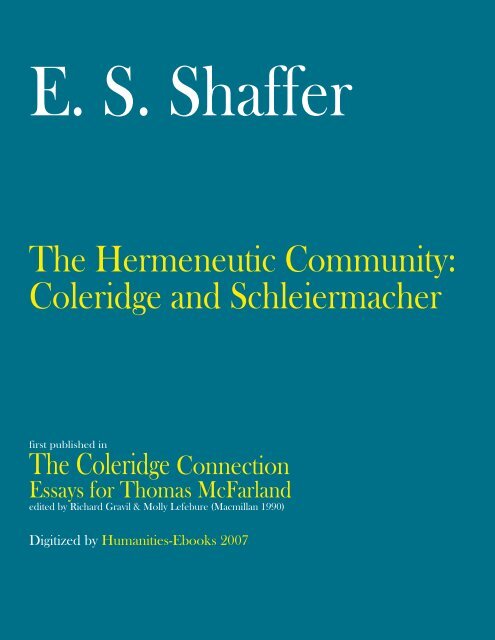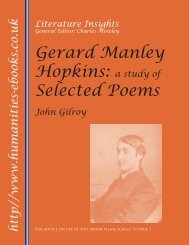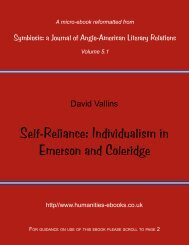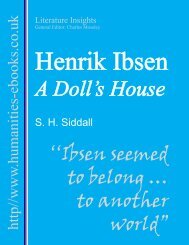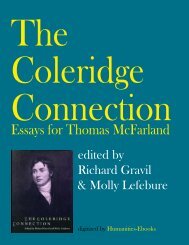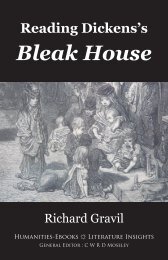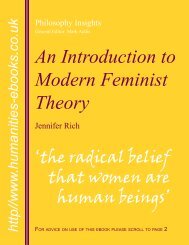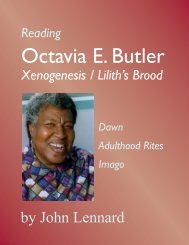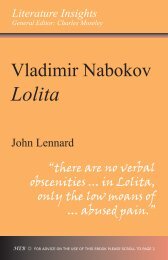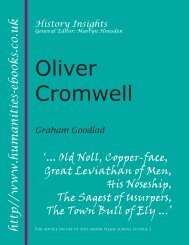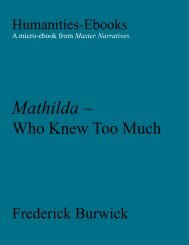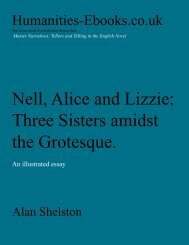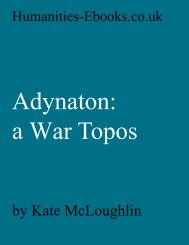Coleridge and Schleiermacher - Humanities-Ebooks
Coleridge and Schleiermacher - Humanities-Ebooks
Coleridge and Schleiermacher - Humanities-Ebooks
You also want an ePaper? Increase the reach of your titles
YUMPU automatically turns print PDFs into web optimized ePapers that Google loves.
E. S. Shaffer<br />
The Hermeneutic Community:<br />
<strong>Coleridge</strong> <strong>and</strong> <strong>Schleiermacher</strong><br />
first published in<br />
The <strong>Coleridge</strong> Connection<br />
Essays for Thomas McFarl<strong>and</strong><br />
edited by Richard Gravil & Molly Lefebure (Macmillan 1990)<br />
Digitized by <strong>Humanities</strong>-<strong>Ebooks</strong> 2007
Publication Data<br />
© E. S. Shaffer, 1990, 2007<br />
The author has asserted her right to be identified as the author of this Work<br />
in accordance with the Copyright, Designs <strong>and</strong> Patents Act 1988.<br />
First published in 1990 by Macmillan in The <strong>Coleridge</strong> Connection, edited<br />
by Richard Gravil <strong>and</strong> Molly Lefebure.<br />
This chapter is extracted from The <strong>Coleridge</strong> Connection, 2nd edition, 2007.<br />
<strong>Humanities</strong>-<strong>Ebooks</strong> LLP , Tirril Hall, Tirril, Penrith CA10 2JE.<br />
Reading Options<br />
* To use the navigation tools, the search facility, <strong>and</strong> other features of the<br />
Adobe toolbar, this Ebook should be read in default view.<br />
* To navigate through the contents use the hyperlinked ‘Bookmarks’ at<br />
the left of the screen.<br />
* To search, exp<strong>and</strong> the search column at the right of the screen or click<br />
on the binocular symbol in the toolbar.<br />
* For ease of reading, use to enlarge the page to full screen<br />
* Use to return to the full menu.<br />
Licence <strong>and</strong> permissions<br />
This book is licensed for a particular computer or computers. The file itself<br />
may be copied, but the copy will not open until the new user obtains a licence<br />
from the <strong>Humanities</strong>-<strong>Ebooks</strong> website in the usual manner. The original purchaser<br />
may license the same work for a second computer by applying to<br />
support@humanities-ebooks.co.uk with proof of purchase.<br />
Permissions: it is permissible to print a copy of this book for your own use,<br />
but not to copy <strong>and</strong> paste text.
from<br />
The <strong>Coleridge</strong> Connection:<br />
Essays for Thomas McFarl<strong>and</strong><br />
edited by Richard Gravil <strong>and</strong> Molly Lefebure<br />
2nd edn. Tirril: <strong>Humanities</strong>-<strong>Ebooks</strong>, 2007
Volume Contents<br />
Table of Abbreviations<br />
1. Richard Gravil, Introduction <strong>and</strong> Orientation<br />
Part One: The Sometime Jacobin?<br />
2. Ian Wylie, <strong>Coleridge</strong> <strong>and</strong> the Lunaticks<br />
3 Nicola Trott, The <strong>Coleridge</strong> Circle <strong>and</strong> the ‘Answer to Godwin’<br />
4 Nicholas Roe, <strong>Coleridge</strong> <strong>and</strong> John Thelwall: the Road to Nether Stowey<br />
Part Two: Friend <strong>and</strong> Ventriloquist<br />
5 Molly Lefebure, Humphry Davy: Philosophic Alchemist<br />
6 Grevel Lindop, Lamb, Hazlitt <strong>and</strong> De Quincey<br />
7 Tim Fulford, <strong>Coleridge</strong> <strong>and</strong> J. H. Green: The Anatomy of Beauty<br />
Part Three: The German Connection<br />
8 James Engell, <strong>Coleridge</strong> <strong>and</strong> German Idealism: First Postulates, Final Causes<br />
9 Frederick Burwick, <strong>Coleridge</strong> <strong>and</strong> Schelling on Mimesis<br />
10 E. S. Shaffer, The Hermeneutic Community: <strong>Coleridge</strong> <strong>and</strong> <strong>Schleiermacher</strong><br />
Part Four: The American Connection<br />
11 Anthony John Harding, <strong>Coleridge</strong> <strong>and</strong> Transcendentalism<br />
12 Jonathan Bate, Edgar Allan Poe: A Debt Repaid<br />
Part Five: Sage <strong>and</strong> Evangelist<br />
13 H. W. Piper, <strong>Coleridge</strong> <strong>and</strong> the Unitarian Consensus<br />
14 Robert Barth SJ, <strong>Coleridge</strong> <strong>and</strong> the Church of Engl<strong>and</strong><br />
15 John Beer, Transatlantic <strong>and</strong> Scottish Connections: Uncollected Records<br />
Select Bibliography: Revised <strong>and</strong> Updated<br />
Search Terms<br />
Volume ISBN 978-1-84760-006-6
10<br />
The Hermeneutic Community: <strong>Coleridge</strong> <strong>and</strong> <strong>Schleiermacher</strong><br />
E. S. SHAFFER<br />
In using the word ‘hermeneutic’ I wish to call attention to the relationship, as yet<br />
largely unexplored, between the work of Friedrich <strong>Schleiermacher</strong> (1768–1834) <strong>and</strong><br />
that of <strong>Coleridge</strong> in beginning to formulate a general hermeneutics, a secular hermeneutics<br />
that would subsume biblical hermeneutics, on the basis of a romantic aesthetics<br />
of creative Verstehen, or Imagination. Wilhelm Dilthey, <strong>Schleiermacher</strong>’s exponent<br />
<strong>and</strong> interpreter in the late nineteenth century, did call attention to the relation between<br />
<strong>Coleridge</strong> <strong>and</strong> <strong>Schleiermacher</strong>, though in very general terms, identifying them both as<br />
belonging to that major group of thinkers who emphasised ‘die geschichtliche Natur<br />
des Menschen und der von ihm geschaffenen Culturformen und Verbände’, ‘the historical<br />
nature of man <strong>and</strong> the cultural forms <strong>and</strong> groupings created by him’. More<br />
recently, Claude Welch has linked their names, in order to establish that <strong>Coleridge</strong> is<br />
of equal stature with <strong>Schleiermacher</strong>: ‘<strong>Coleridge</strong> must again be seen as a real turning<br />
point into the new kinds of theologising that mark the nineteenth century, a thinker as<br />
important for British <strong>and</strong> American thought as were <strong>Schleiermacher</strong> <strong>and</strong> Hegel’. <br />
The new tendency to regard the Bible not as the product of dictation by the Holy<br />
Ghost but as the work of men, <strong>and</strong> the rational inquiry into historical sources casting<br />
doubt on the trustworthiness of the reports of events in both Testaments as in other<br />
texts, threw the burden of determining <strong>and</strong> maintaining the significance of the text,<br />
even canonicity itself, on the community that received it, both the historical community<br />
of early Christianity so far as it could be determined, <strong>and</strong> the present community.<br />
This momentous shift, clearly expressed by J. G. Eichhorn (1752–1827),<br />
a major influence on both <strong>Schleiermacher</strong> <strong>and</strong> <strong>Coleridge</strong>, was elaborated by both<br />
<br />
<br />
Wilhelm Dilthey, ‘<strong>Schleiermacher</strong>’, Allgemeine Deutsche Biographie, Bd. 30, 450. Dilthey places<br />
in this same group Goethe, Schelling, Hegel, ‘the Romantics <strong>and</strong> the historical school’, Carlyle,<br />
Maine de Biran, <strong>and</strong> Guizot, <strong>Schleiermacher</strong> is compared to Wordsworth in J. Arundel Chapman,<br />
Introduction to <strong>Schleiermacher</strong> (London: Epworth Press, 1932), to Wordsworth’s advantage.<br />
Claude Welch, ‘Samuel Taylor <strong>Coleridge</strong>’, Nineteenth Century Religious Thought in the West,<br />
vol. ii, eds Ninian Smart, et al. (Cambridge University Press, 1985) p. 2.


